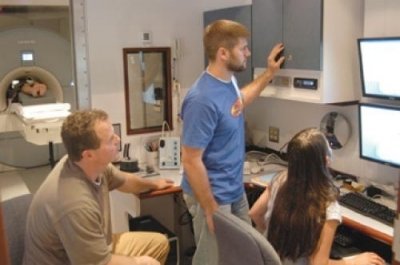RESEARCH HISTORY
Dr. Kiehl is an author and neuroscientist who specializes in the use of clinical brain imaging techniques to understand major mental illnesses, with special focus on criminal psychopathy, psychotic disorders (i.e., schizophrenia, bipolar disorder, affective disorders), traumatic brain injury, substance abuse and paraphilias.
Dr. Kiehl designed a one-of-a-kind Mind Mobile MRI System to conduct research and treatment studies with forensic populations. To date his laboratory has deployed the Mind Mobile MRI System to collect brain imaging data from over 4000 offenders at ten different facilities in two states. This represents the world’s largest forensic neuroscience repository.
In September of 2019, we accepted delivery of a twin Mobile MRI. Due to continued growth and increasing demand for brain imaging in difficult to reach populations, the Board of Directors of the Mind Research Network (a 501c3 nonprofit) purchased a second Mobile MRI. Mobile MRI 2 will provide sufficient capacity to allow growth in new areas, including studying health disparities in Native American Pueblos, traumatic brain injury in US military service personnel, and the impact of solitary confinement on the brain.
If you are interested in exploring the use the Mind Twin Mobile MRIs for your clinical and/or research questions, please contact Dr. Kiehl.
Dr. Kiehl is often invited to lecture for state and federal judges, lawyers, probation officers, correctional officials, academic audiences and the public about the intersection of neuroscience and law and psychopaths and the law. In the last several years he has worked with the Federal Judicial Center (FJC) to develop the educational curriculum for federal judges on neuroscience in the courtroom.
Dr. Kiehl also serves as a legal consultant on criminal and civil cases involving neuroscience and law. He helped formed a neuroscience and law consulting group, known as MINDSET, to aid lawyers and judges in the appropriate use (and misuse) of neuroscience in the courtroom.
His scientific training began as an undergraduate in psychology and neuroscience at the University of California Davis. He completed his undergraduate thesis under the mentorship of Dr. Michael (Rick) Levenson. Part of their collaboration resulted in the publication of the Levenson Self-report Psychopathy Scale (LSRP), an instrument that is still widely used today to assess psychopathic traits in non-forensic samples. He began his training in neuroscience as research assistant in the UC Davis Center for Neuroscience working with Dr. Michael Gazzaniga and Dr. George (Ron) Mangun. It was during this time he was trained in the intricacies of experimental design and the analyses of brain imaging data.
Dr. Kiehl completed his doctorate in psychology and neuroscience in 2000 from the University of British Columbia. Dr. Kiehl was co-mentored by Dr. Robert Hare and Dr. Peter Liddle. Dr. Hare is the world’s leading authority on psychopathy and author of The Hare Psychopathy Checklist-Revised (PCL-R), the most widely used test to assess psychopathic traits in clinical populations. Dr. Kiehl is one of a handful of certified trainers who educate clinicians in the appropriate use of the Hare PCL-R in clinical populations.
Dr. Liddle is leading authority on the neuroscience of schizophrenia and he was one of the founding members at Hammersmith Hospital that created the software Statistical Parametric Mapping (SPM). SPM is the most widely used software in the world for the analyses of brain imaging data. Dr. Kiehl teaches seminars to the academics and businesses on the use of SPM in research.
During his time in graduate school, Dr. Kiehl authored over 20 peer-reviewed manuscripts; one of them was the first study using functional magnetic resonance imaging (fMRI) to examine brain dysfunction in criminal psychopaths.
In 2001, Dr. Kiehl joined the faculty in the Departments of Psychiatry and Psychology at Yale University. His laboratory was located the Olin Neuropsychiatry Research Center at the Institute of Living/Hartford Hospital where he pursued his research program in the study of psychopathy and schizophrenia.
In 2007, Dr. Kiehl was jointly recruited by the nonprofit Mind Research Network and the University of New Mexico (UNM). Dr. Kiehl is a tenured full professor in the departments of Psychology (primary), Neuroscience, and Law at UNM.
Dr. Kiehl was one of the original members of the MacArthur Foundation Law and Neuroscience Project led by Dr. Michael Gazzaniga. As part of his role on the MacArthur project Dr. Kiehl co-edited with Dr. Walter Sinnott-Armstrong a Handbook on Psychopathy and Law (Oxford Press). The book is available on Amazon.
Outside of work, Dr. Kiehl enjoys spending time with his wife Lyn and two children, Kaitlyn and Cody. He is an avid golfer, skier, mountain biker, canine enthusiast, overlander, mountaineer, backpacker, and cetaceanologist.
